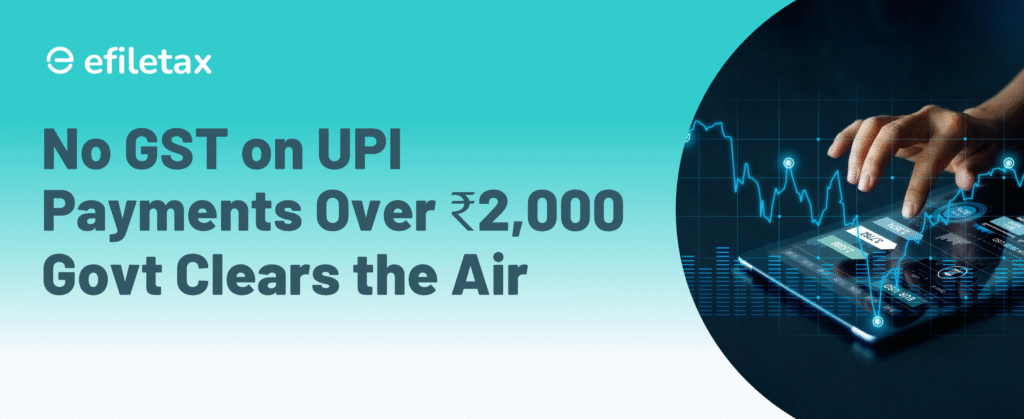
No GST on UPI Transactions Above ₹2,000: What You Should Know
The question of GST on UPI transactions above ₹2,000 created buzz recently. But let’s clear the air—there’s no GST levied on UPI payments, whether above or below ₹2,000, when it’s a money transfer and not linked to a taxable supply.
Here’s what the government actually said—and what it means for you.
What Triggered the Confusion?
- A social media post claimed UPI transactions above ₹2,000 would attract GST
- The claim went viral, suggesting peer-to-peer (P2P) payments could be taxed
- CBIC issued a clarification debunking the misinformation
CBIC Clarification: No GST on UPI Payments
On 23rd July 2025, the Central Board of Indirect Taxes and Customs (CBIC) issued a public clarification via its official X (Twitter) handle:
“There is no proposal to levy GST on UPI or IMPS transactions. Such digital transactions merely represent the mode of payment.”
Translation:
Paying someone via UPI—be it a friend, landlord, or vendor—is not a taxable event in itself.
When Can UPI Transactions Attract GST?
While UPI payments do not attract GST directly, GST may apply if:
| Situation | GST Applicability |
|---|---|
| Paying for goods/services | GST applies on the underlying supply |
| Sending money to friends/family | No GST |
| Paying rent via UPI | GST applies only if landlord is registered and rent exceeds threshold |
| Paying credit card bills | No GST on payment, but credit services may attract GST |
| Donations to registered NGOs | Exempt under Section 12AA/80G, no GST |
| Business-to-business payment | GST applies if linked to taxable supply |
Legal Reference: What the Law Says
- GST is levied on “supply” of goods/services under Section 9 of the CGST Act
- UPI is just a payment method, not a taxable service or supply
- Mere money transfers (not linked to any sale or service) are not a supply under GST
Expert View: Don’t Confuse Mode with Tax Liability
Many taxpayers confuse payment mode with tax incidence. But as per Rule 46 of the CGST Rules, invoices must specify payment mode only for record purposes—not for determining tax.
Tip: For businesses, keep UPI receipts linked to invoices for better GST audit trail.
Focus Keyphrase in Subheading
GST on UPI Transactions Above ₹2,000: Fact Check
- No GST on digital transfers like UPI or IMPS
- GST applies only on the goods or services bought—not the mode of payment
- Fake claims on social media can mislead taxpayers—always verify with official sources
Final Word: Don’t Fall for Misinformation
The government isn’t taxing your UPI payments—not even above ₹2,000. GST is supply-based, not payment-based. Stay informed, stay compliant.
If you’re confused about GST applicability on your business or rent payments, let Efiletax handle it.
👉 Talk to our GST experts at Efiletax.in and file stress-free.
FAQ
Q1: Is there any GST on sending money through UPI?
No. Sending money via UPI is not a supply of goods or services, so it’s not taxable.
Q2: What if I pay my shopkeeper via UPI—will GST apply?
Yes, if you’re buying taxable goods/services, GST applies—but not because of UPI.
Q3: Is GST applicable on rent payments via UPI?
Only if your landlord is registered under GST and rent exceeds ₹20,000/month (for commercial).
Summary
No GST on UPI transactions above ₹2,000, confirms CBIC. Digital payments are not taxable events unless linked to supply of goods/services.